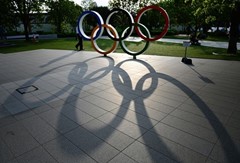
May 13, 2021
We don't know how many people were satisfied with Prime Minister Yoshihide Suga's remarks in the Diet on May 10.
All we do know for certain is that Japan is in no state to hold the Tokyo Olympics this summer.
At the May 10 Budget Committee meetings of both chambers of the Diet, the focal issue was whether the Tokyo Olympics and Paralympics should be held as planned.
But Suga's comments left little doubt that he was intent on evading responsibility, as was obvious from his repeated reference to the International Olympic Committee, the International Paralympic Committee, the Tokyo metropolitan government and the Tokyo Olympics organizing committee as the "parties responsible for organizing" the Games.
Nothing he said resonated with the public.
Will Suga give the Olympics the green light even if the pandemic is at Stage 4, which is defined as a state of explosive spread of the virus? How is he going to control the movement of tens of thousands of Olympic-related officials visiting Japan?
And how does he intend to establish a dedicated health care system for Olympians without risking the lives and health of the public at large?
To all these questions, Suga merely replied that "every effort will be made to ensure that the Olympics will be held safely and in a manner that will put everyone at ease."
In short, he didn't have an answer.
Not only Japan, but the entire world is demanding that the Olympics not be allowed as it threatens to become a superspreader event.
Suga's inability and/or refusal to offer any answer has further deepened our doubts about going ahead with the Games.
His is the administration that has repeatedly promised to bring the infections under control and has let us down every time.
We have no interest in knowing what the prime minister believes or hopes for. His failure to explain how he intends to attain his goal is tantamount to an outright refusal to live up to his accountability.
The same pattern holds for his approach to vaccinations, too.
The IOC recently announced it has reached an agreement with U.S. and German pharmaceutical companies on free vaccine shots for Olympic athletes. This must be good news for Suga and his promise of keeping the Games safe and worry-free.
But on the other hand, the surprise announcement has raised various questions: Is it fair to give priority treatment to athletes under the current circumstances? How will the Japanese public at large feel about this? Will this generate hard feelings? And will the athletes be guaranteed their right to refuse a vaccination?
But the government and the Tokyo Olympics organizing committee have reacted to the IOC announcement with nothing but overt enthusiasm. In the absence of any further explanation from the authorities about what the announcement entails, the athletes are being left in a state of confusion.
So much for the authenticity of the "athletes first" protestation.
As for other matters, local administrative bodies that are volunteering to host foreign athletes are struggling to reconcile necessary preparations with COVID-19 restrictions, while athletes in some countries have been forced to sit out qualifying events because of overseas travel bans.
It has become increasingly certain that the Tokyo Olympics will be unable to fulfill the most important Olympic ideal, which is to bring together people from around the world to deepen mutual understanding.
Why, then, is Japan still determined to bring the Games to Tokyo?
In our editorials we have repeatedly called for an explanation, but neither the government nor any of the organizing committees have communicated with us to our satisfaction.
Their blind belief in staging the Tokyo Olympics as a forgone conclusion is generating distrust and breakdowns in logic.
--The Asahi Shimbun, May 12
© Baseball Federation of Asia. All RIGHTS RESERVED. / PRIVACY POLICY